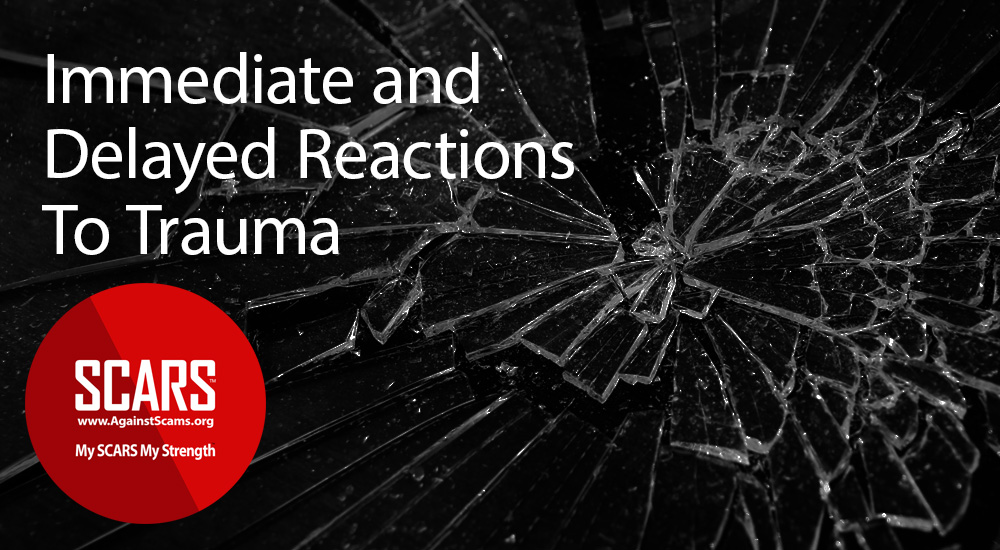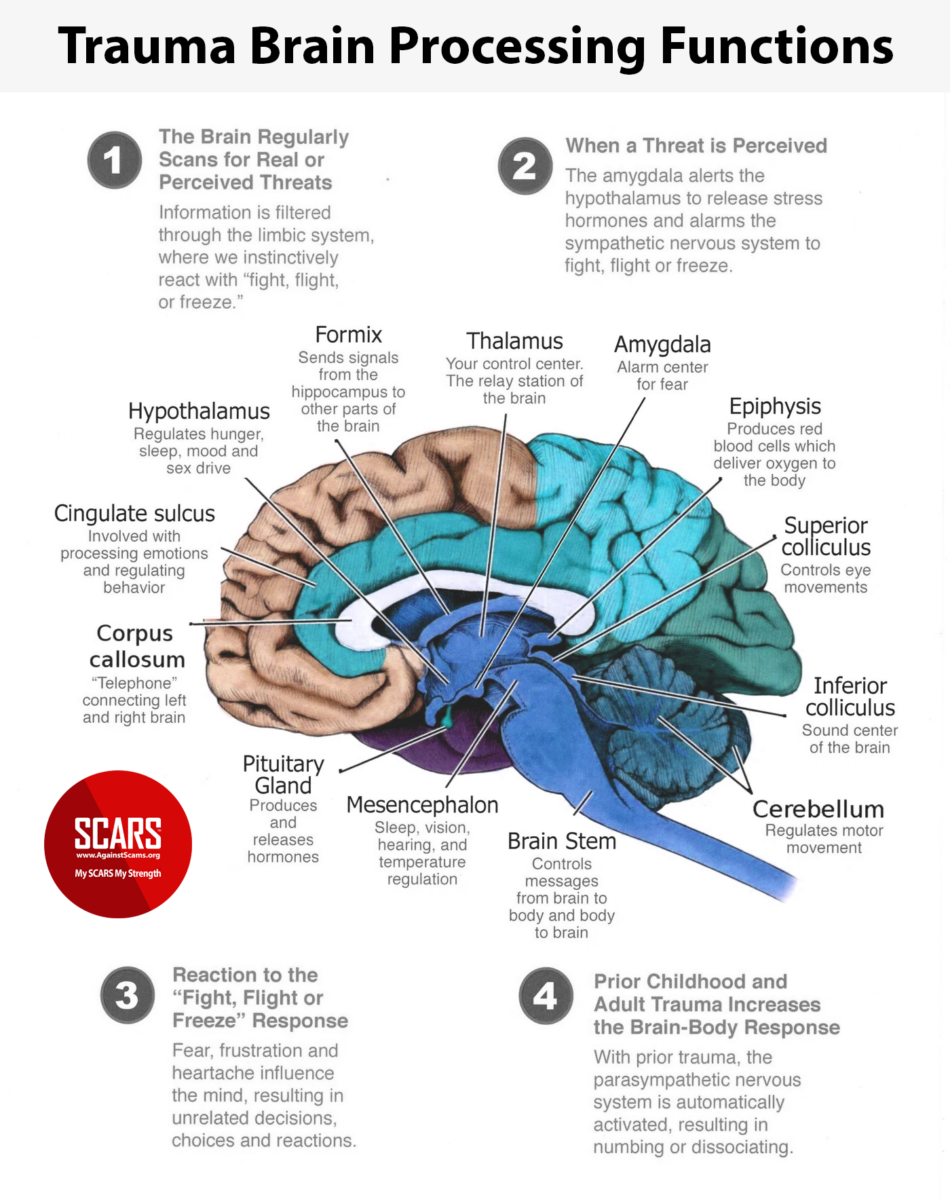
SCARS Institute’s Encyclopedia of Scams™ Published Continuously for 25 Years

Trauma Plays A Massive Role In Romance Scam Victims
It influences or controls almost every aspect of a victim’s life until it is resolved or addressed.
Far too many victims (almost 60%) do not address their trauma, and as a result to not successfully recover or recover over a much longer period of time. The common belief in them is that we’re not affected or they can easily deal with it. Science and the history of trauma recovery, specifically in the case of scam victims prove this attitude to be wrong.
The Sequence of Trauma Reactions
Survivors’ immediate reactions in the aftermath of trauma are quite complicated and are affected by their own experiences, the accessibility of natural supports and healers, their coping and life skills and those of immediate family, and the responses of the larger community in which they live. Although reactions range in severity, even the most acute responses are natural responses to manage trauma— they are not a sign of psychopathology.
Coping styles vary from action-oriented to reflective and from emotionally expressive to reticent. Clinically, a response style is less important than the degree to which coping efforts successfully allow one to continue necessary activities, regulate emotions, sustain self-esteem, and maintain and enjoy interpersonal contacts. The most recent psychological approaches emphasize respecting the individual’s style of coping and not valuing one type over another.
Trauma can affect one’s beliefs about the future via loss of hope, limited expectations about life, fear that life will end abruptly or early, or anticipation that normal life events won’t occur (e.g., access to education, ability to have a significant and committed relationship, good opportunities for work).
Initial reactions to trauma can include exhaustion, confusion, sadness, anxiety, agitation, numbness, dissociation, confusion, physical arousal, and blunted effect. Most responses are normal in that they affect most survivors and are socially acceptable, psychologically effective, and self-limited.
Indicators of more severe responses include continuous distress without periods of relative calm or rest, severe dissociation symptoms, and intense intrusive recollections that continue despite a return to safety.
Delayed responses to trauma can include persistent fatigue, sleep disorders, nightmares, fear of recurrence, anxiety focused on flashbacks, depression, and avoidance of emotions, sensations, or activities that are associated with the trauma, even remotely.
The following outlines some common reactions:
Immediate Emotional Reactions
- Numbness and detachment
- Anxiety or severe fear
- Guilt (including survivor guilt)
- Exhilaration as a result of surviving
- Anger
- Sadness
- Helplessness
- Feeling unreal; depersonalization (e.g., feeling as if you are watching yourself)
- Disorientation
- Feeling out of control
- Denial
- Constriction of feelings
- Feeling overwhelmed
Delayed Emotional Reactions
- Irritability and/or hostility
- Depression
- Mood swings, instability
- Anxiety (e.g., phobia, generalized anxiety)
- Fear of trauma recurrence
- Grief reactions
- Shame
- Feelings of fragility and/or vulnerability
- Emotional detachment from anything that requires emotional reactions (e.g., significant and/or family relationships, conversations about self, discussion of traumatic events or reactions to them)
Immediate Physical Reactions
- Nausea and/or gastrointestinal distress
- Sweating or shivering
- Faintness
- Muscle tremors or uncontrollable shaking
- Elevated heartbeat, respiration, and blood pressure
- Extreme fatigue or exhaustion
- Greater startle responses
- Depersonalization
Delayed Physical Reactions
- Sleep disturbances, nightmares
- Somatization (e.g., increased focus on and worry about body aches and pains)
- Appetite and digestive changes
- Lowered resistance to colds and infection
- Persistent fatigue
- Elevated cortisol levels
- Hyperarousal
- Long-term health effects include heart, liver, autoimmune, and chronic obstructive pulmonary disease
Immediate Cognitive Reactions
- Difficulty concentrating
- Rumination or racing thoughts (e.g., replaying the traumatic event over and over again)
- Distortion of time and space (e.g., a traumatic event may be perceived as if it was happening in slow motion, or a few seconds can be perceived as minutes)
- Memory problems (e.g., not being able to recall important aspects of the trauma)
- Strong identification with victims
Delayed Cognitive Reactions
- Intrusive memories or flashbacks
- Reactivation of previous traumatic events
- Self-blame
- Preoccupation with event
- Difficulty making decisions
- Magical thinking: belief that certain behaviors, including avoidant behavior, will protect against future trauma
- A belief that feelings or memories are dangerous
- Generalization of triggers (e.g., a person who experiences a home invasion during the daytime may avoid being alone during the day)
- Suicidal thinking
Immediate Behavioral Reactions
- Startled reaction
- Restlessness
- Sleep and appetite disturbances
- Difficulty expressing oneself
- Argumentative behavior
- Increased use of alcohol, drugs, and tobacco
- Withdrawal and apathy
- Avoidant behaviors
Delayed Behavioral Reactions
- Avoidance of event reminders
- Social relationship disturbances
- Decreased activity level
- Engagement in high-risk behaviors
- Increased use of alcohol and drugs
- Withdrawal
Immediate Existential Reactions
- Intense use of prayer
- Restoration of faith in the goodness of others (e.g., receiving help from others)
- Loss of self-efficacy
- Despair about humanity, particularly if the event was intentional
- Immediate disruption of life assumptions (e.g., fairness, safety, goodness, predictability of life)
Delayed Existential Reactions
- Questioning (e.g., “Why me?”)
- Increased cynicism, disillusionment
- Increased self-confidence (e.g., “If I can survive this, I can survive anything”)
- Loss of purpose
- Renewed faith
- Hopelessness
- Reestablishing priorities
- Redefining meaning and importance of life
- Reworking life’s assumptions to accommodate the trauma (e.g., taking a self-defense class to re-establish a sense of safety)
Summary
If you feel like you are experiencing any of the above symptoms after a romance scam, then it is advisable to speak to your doctor or therapist. However, it does not mean that everything is unhealthy for you. This article is intended as a summary allowing you to see if you recognize any of these responses to trauma, and allowing you to do further research on your own or discuss it with your mental healthcare professional.
If you have experienced trauma SCARS recommends that you find a local trauma counselor or therapist. We provide scam victim support groups, but you are always best consulting a licensed certified trauma professional. This is all about your future happiness and recovery from this traumatic experience.
If you are looking for local trauma counselors please use the following resources to find one:
- www.opencounseling.com
- www.psychologytoday.com/us/therapists/trauma-and-ptsd
- www.betterhelp.com/therapists
- www.nbcc.org/Search/CounselorFind
- www.talkspace.com
- www.therapyroute.com
Sources:
Briere & Scott, 2006b; Foa, Stein, & McFarlane, 2006; Pietrzak, Goldstein, Southwick, & Grant, 2011.
From: Chapter 3, Understanding the Impact of Trauma
Trauma-Informed Care in Behavioral Health Services.
Treatment Improvement Protocol (TIP) Series, No. 57.
Center for Substance Abuse Treatment (US).
Rockville (MD): Substance Abuse and Mental Health Services Administration (US); 2014.
Copyright NoticeNCBI Bookshelf. A service of the National Library of Medicine, National Institutes of Health.
TAGS: SCARS, Trauma Effects, Immediate Trauma, Delayed Trauma, Traumatized Victims, Information About Scams, Anti-Scam, Scams, Scammers, Fraudsters, Cybercrime, Crybercriminals, Romance Scams, Scam Victims,
-/ 30 /-
What do you think about this?
Please share your thoughts in a comment below!
Table of Contents
- Understanding Scam Victim Trauma
- Trauma Plays A Massive Role In Romance Scam Victims
- The Sequence of Trauma Reactions
- Immediate Emotional Reactions
- Delayed Emotional Reactions
- Immediate Physical Reactions
- Delayed Physical Reactions
- Immediate Cognitive Reactions
- Delayed Cognitive Reactions
- Immediate Behavioral Reactions
- Delayed Behavioral Reactions
- Immediate Existential Reactions
- Delayed Existential Reactions
- Summary
- Sources:
LEAVE A COMMENT?
Recent Comments
On Other Articles
- Arwyn Lautenschlager on Love Bombing And How Romance Scam Victims Are Forced To Feel: “I was love bombed to the point that I would do just about anything for the scammer(s). I was told…” Feb 11, 14:24
- on Dani Daniels (Kira Lee Orsag): Another Scammer’s Favorite: “You provide a valuable service! I wish more people knew about it!” Feb 10, 15:05
- on Danielle Delaunay/Danielle Genevieve – Stolen Identity/Stolen Photos – Impersonation Victim UPDATED 2024: “We highly recommend that you simply turn away form the scam and scammers, and focus on the development of a…” Feb 4, 19:47
- on The Art Of Deception: The Fundamental Principals Of Successful Deceptions – 2024: “I experienced many of the deceptive tactics that romance scammers use. I was told various stories of hardship and why…” Feb 4, 15:27
- on Danielle Delaunay/Danielle Genevieve – Stolen Identity/Stolen Photos – Impersonation Victim UPDATED 2024: “Yes, I’m in that exact situation also. “Danielle” has seriously scammed me for 3 years now. “She” (he) doesn’t know…” Feb 4, 14:58
- on An Essay on Justice and Money Recovery – 2026: “you are so right I accidentally clicked on online justice I signed an agreement for 12k upfront but cd only…” Feb 3, 08:16
- on The SCARS Institute Top 50 Celebrity Impersonation Scams – 2025: “Quora has had visits from scammers pretending to be Keanu Reeves and Paul McCartney in 2025 and 2026.” Jan 27, 17:45
- on Scam Victims Should Limit Their Exposure To Scam News & Scammer Photos: “I used to look at scammers photos all the time; however, I don’t feel the need to do it anymore.…” Jan 26, 23:19
- on After A Scam, No One Can Tell You How You Will React: “This article was very informative, my scams happened 5 years ago; however, l do remember several of those emotions and/or…” Jan 23, 17:17
- on Situational Awareness and How Trauma Makes Scam Victims Less Safe – 2024: “I need to be more observant and I am practicing situational awareness. I’m saving this article to remind me of…” Jan 21, 22:55
ARTICLE META
Important Information for New Scam Victims
- Please visit www.ScamVictimsSupport.org – a SCARS Website for New Scam Victims & Sextortion Victims
- Enroll in FREE SCARS Scam Survivor’s School now at www.SCARSeducation.org
- Please visit www.ScamPsychology.org – to more fully understand the psychological concepts involved in scams and scam victim recovery
If you are looking for local trauma counselors please visit counseling.AgainstScams.org or join SCARS for our counseling/therapy benefit: membership.AgainstScams.org
If you need to speak with someone now, you can dial 988 or find phone numbers for crisis hotlines all around the world here: www.opencounseling.com/suicide-hotlines
A Note About Labeling!
We often use the term ‘scam victim’ in our articles, but this is a convenience to help those searching for information in search engines like Google. It is just a convenience and has no deeper meaning. If you have come through such an experience, YOU are a Survivor! It was not your fault. You are not alone! Axios!
A Question of Trust
At the SCARS Institute, we invite you to do your own research on the topics we speak about and publish, Our team investigates the subject being discussed, especially when it comes to understanding the scam victims-survivors experience. You can do Google searches but in many cases, you will have to wade through scientific papers and studies. However, remember that biases and perspectives matter and influence the outcome. Regardless, we encourage you to explore these topics as thoroughly as you can for your own awareness.
Statement About Victim Blaming
SCARS Institute articles examine different aspects of the scam victim experience, as well as those who may have been secondary victims. This work focuses on understanding victimization through the science of victimology, including common psychological and behavioral responses. The purpose is to help victims and survivors understand why these crimes occurred, reduce shame and self-blame, strengthen recovery programs and victim opportunities, and lower the risk of future victimization.
At times, these discussions may sound uncomfortable, overwhelming, or may be mistaken for blame. They are not. Scam victims are never blamed. Our goal is to explain the mechanisms of deception and the human responses that scammers exploit, and the processes that occur after the scam ends, so victims can better understand what happened to them and why it felt convincing at the time, and what the path looks like going forward.
Articles that address the psychology, neurology, physiology, and other characteristics of scams and the victim experience recognize that all people share cognitive and emotional traits that can be manipulated under the right conditions. These characteristics are not flaws. They are normal human functions that criminals deliberately exploit. Victims typically have little awareness of these mechanisms while a scam is unfolding and a very limited ability to control them. Awareness often comes only after the harm has occurred.
By explaining these processes, these articles help victims make sense of their experiences, understand common post-scam reactions, and identify ways to protect themselves moving forward. This knowledge supports recovery by replacing confusion and self-blame with clarity, context, and self-compassion.
Additional educational material on these topics is available at ScamPsychology.org – ScamsNOW.com and other SCARS Institute websites.
Psychology Disclaimer:
All articles about psychology and the human brain on this website are for information & education only
The information provided in this article is intended for educational and self-help purposes only and should not be construed as a substitute for professional therapy or counseling.
While any self-help techniques outlined herein may be beneficial for scam victims seeking to recover from their experience and move towards recovery, it is important to consult with a qualified mental health professional before initiating any course of action. Each individual’s experience and needs are unique, and what works for one person may not be suitable for another.
Additionally, any approach may not be appropriate for individuals with certain pre-existing mental health conditions or trauma histories. It is advisable to seek guidance from a licensed therapist or counselor who can provide personalized support, guidance, and treatment tailored to your specific needs.
If you are experiencing significant distress or emotional difficulties related to a scam or other traumatic event, please consult your doctor or mental health provider for appropriate care and support.
Also read our SCARS Institute Statement about Professional Care for Scam Victims – click here to go to our ScamsNOW.com website.

















Thank you for your comment. You may receive an email to follow up. We never share your data with marketers.